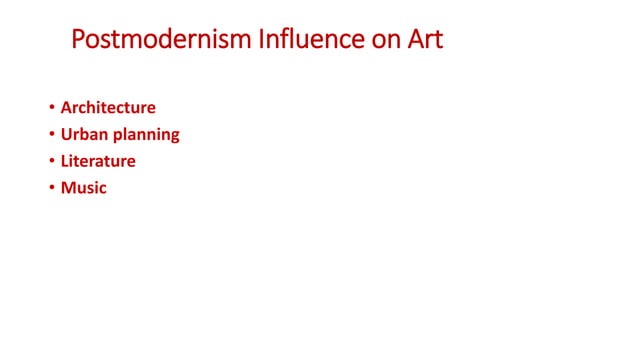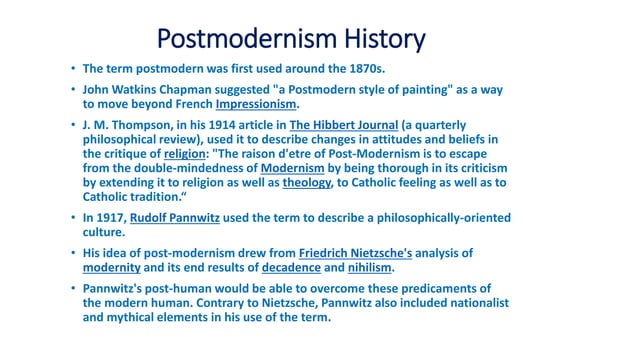Have you ever felt adrift in a sea of images, bombarded by a cacophony of messages, and overwhelmed by the sheer volume of information and experiences? It’s as if the world is conspiring to shatter our sense of reality, leaving us questioning the very foundations of truth and meaning. This, in essence, is the postmodern condition, a term often used to describe the cultural landscape of late capitalism, a society characterized by fragmentation, hyper-consumerism, and the dominance of mediated realities.

Image: www.slideshare.net
This article delves into the intricate relationship between postmodernism and late capitalism, exploring how these forces have shaped our contemporary world. By understanding the cultural logic of late capitalism, we can better navigate the complexities of our times and discover new ways to engage with the world around us.
The Rise of Postmodernism: A Rejection of Grand Narratives
Postmodernism emerged as a reaction to a perceived crisis of modernism, which had dominated intellectual and cultural thought throughout the 19th and 20th centuries. Modernism was characterized by faith in reason, progress, and universal truths. It sought to establish definitive systems and structures that could explain the world around us. However, as the 20th century progressed, the grand narratives of modernism began to unravel. The horrors of World War II and the rise of totalitarianism undermined the belief in human rationality and progress.
Postmodernism, in its various forms, questioned the very foundations of truth, meaning, and knowledge. It rejected the idea of universal truths and instead embraced the concept of multiple interpretations, fragmented realities, and the relativity of truth. The emphasis shifted from objective knowledge to subjective experience, from grand narratives to individual stories, and from fixed meanings to fluid and constantly evolving interpretations.
The Cultural Logic of Late Capitalism: Commodity Fetishism and the Simulation of Reality
Late capitalism, as a complex social and economic system, has played a crucial role in shaping the postmodern condition. This period is characterized by hyper-consumerism, globalization, and the increasing dominance of media and technology. These forces have created a cultural environment where the boundaries between reality and simulation become increasingly blurred.
One of the key characteristics of late capitalism is the phenomenon of **commodity fetishism**, where goods become imbued with symbolic meanings that transcend their actual utility value. Objects become fetishized, not just for their practical use, but for their ability to signify status, identity, and belonging. In this context, consumption becomes a signifier, a way of expressing oneself and constructing one’s identity in a fragmented and often hyper-competitive world.
The proliferation of media and technology has further intensified the simulation of reality. In a world saturated with images, sounds, and digital experiences, the distinction between the real and the simulated becomes increasingly ambiguous. The constant flow of information, often curated and manipulated for commercial purposes, creates a kind of **hyperreality**, where the distinction between reality and representation becomes increasingly difficult to discern.
The Impact of Postmodernism and Late Capitalism on Everyday Life
The cultural logic of late capitalism and the influence of postmodern thought have had a profound impact on our lives, shaping our experiences, values, and identities. These forces have created a world where:
- Identity is fluid and fragmented: In a world of countless choices and competing narratives, individuals are free to construct their own identities, borrowing from and combining diverse influences. This can lead to a sense of liberation and empowerment, but also to a feeling of fragmentation and instability.
- Consumption is a cultural ritual: Our consumption choices become a form of self-expression, a way of signifying our identity and status within a complex and competitive consumer landscape. The rise of social media has further intensified this trend, creating a culture of instant gratification and aspirational consumption.
- The media shapes our perception of reality: The flow of information, often curated and manipulated for commercial purposes, creates a kind of “constructed reality.” We are constantly bombarded with images and stories that influence our opinions and beliefs, blurring the lines between the real and the simulated.
- Truth is relative: The rejection of universal truths has led to a culture of skepticism and a heightened awareness of the biases and agendas that shape our perspectives. This can be both liberating and disorienting, as it challenges the traditional bases for knowledge and understanding.

Image: www.slideshare.net
Critics of the Postmodern Condition: The Challenges of Fragmentation and Nihilism
While postmodernism and late capitalism have brought about significant cultural and social shifts, these forces have also been subject to criticism. Critics argue that the emphasis on fragmentation and the rejection of grand narratives can lead to:
- A loss of meaning and purpose: Without a sense of shared values or a common framework for understanding the world, some argue that postmodernism can lead to a sense of nihilism and apathy.
- A depoliticization of social issues: The emphasis on individual experiences and subjective interpretations can obscure the collective forces shaping our lives and make it difficult to mobilize for social change.
- The rise of cynicism and apathy: A growing sense of disillusionment with traditional institutions and social structures can lead to political disengagement and a lack of faith in collective action.
Navigating the Postmodern Condition: Engaging with Complexity and Cultivating Meaning
The postmodern condition presents us with a complex and challenging landscape. We are bombarded with information, confronted with multiple realities, and constantly navigating the shifting tides of consumerism and technology. But it is precisely this complexity that offers us the opportunity to engage with the world in new and meaningful ways.
Rather than retreating into cynicism or apathy, we can use this moment as an opportunity to cultivate a deeper understanding of our cultural landscape and our place within it. We can:
- Embrace critical thinking and media literacy: Develop the skills to critically evaluate the information we encounter and to recognize the biases and agendas that shape our understanding of the world.
- Engage in meaningful dialogue: Seek out diverse perspectives and engage in conversations that challenge our assumptions and promote mutual understanding.
- Create our own narratives: In a fragmented world, we can find meaning and purpose by constructing our own stories, finding ways to connect our personal experiences to broader social and cultural forces.
- Advocate for social justice: In a culture often marked by hyper-individualism, it is important to recognize the interconnectedness of our lives and to work towards creating a more just and equitable world.
Postmodernism Or The Cultural Logic Of Late Capitalism
Conclusion: Living in the Kaleidoscope
Postmodernism and the cultural logic of late capitalism have profoundly shaped our world. While these forces present us with challenges, they also represent an opportunity for deeper self-awareness and engagement with the complexity of our times. By embracing critical thinking, seeking out diverse perspectives, and actively constructing our own meanings, we can navigate the kaleidoscopic landscape of the postmodern condition and find meaning and purpose in a world of fragmented realities and ever-shifting structures.






